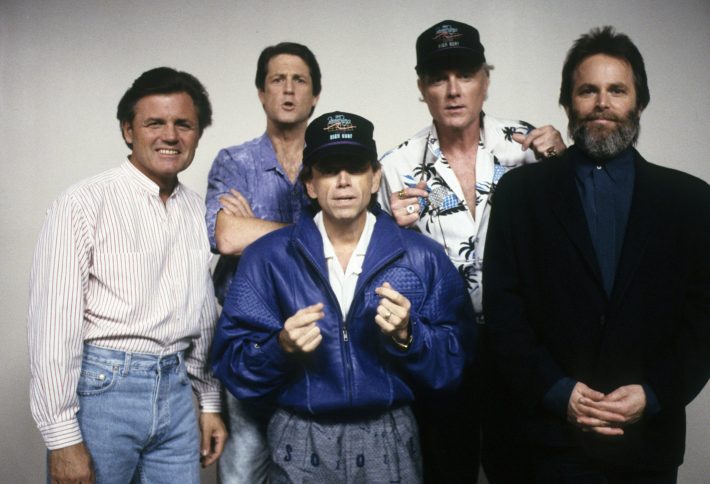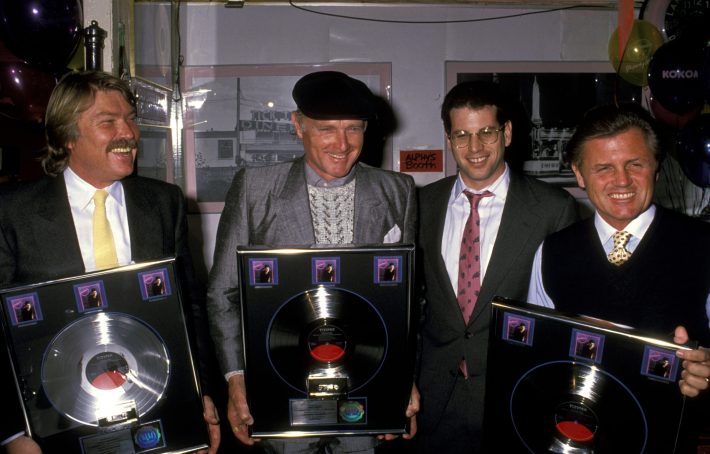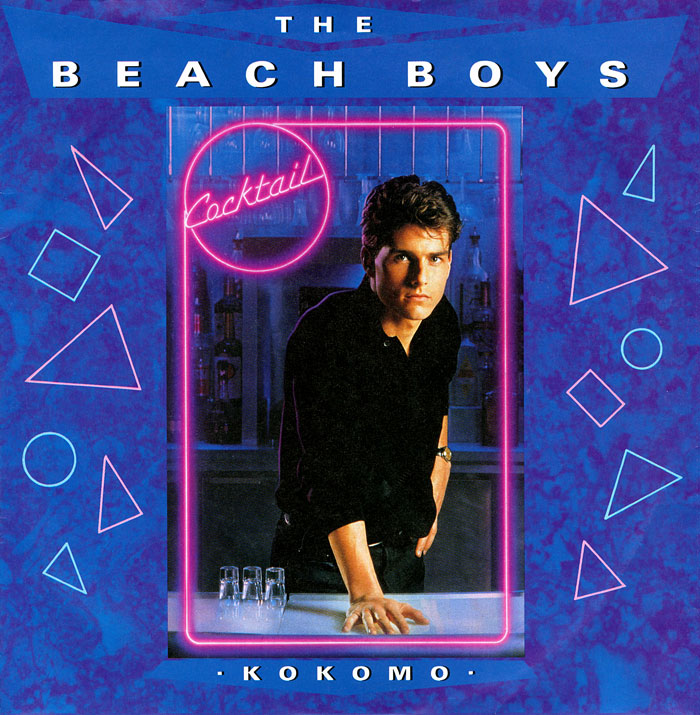We'll start with the most obvious thing: there is no Kokomo. Not off the Florida Keys, anyway. Sure, a couple places staked claims, but only after the occurence of the least obvious thing: a has-been pop act, minus their creative engine, scoring a #1 hit off the soundtrack to a forgettable film about bartending. "Kokomo" -- released 30 years ago this month -- was the Beach Boys' first original Top 20 single in 20 years, and their first chart-topper in 22.
https://youtube.com/watch?v=SbqLCMVRU8o
With or without their erstwhile captain Brian Wilson, the Beach Boys never came close to replicating their early success, but no matter: Every time a quizmaster asks what the seven locations are in the song's chorus, every Gen-X hand in the bar lunges for the pen. "Kokomo" was a peculiar last cultural gasp for everyone involved: not just the performers, but also their collaborators. Together, they formed a coastal coterie, an assemblage of connections both fortuitous and tragic.
The state of the Beach Boys in 1988 was, in a word, shitty. Their last record, 1985's digitally crispy The Beach Boys, performed middlingly despite contributions from Culture Club, Ringo Starr, and Stevie Wonder. A couple clues to their malaise appear within the record. On the back, there's a dedication "to the memory of our beloved brother, cousin and friend"; Dennis Wilson, the band's drummer and only true surfer, had drowned in the water off Marina Del Rey in December of 1983. And on the label, there are three songwriting credits for E. E. Landy.
That would be Dr. Eugene Landy, Brian's personal therapist, business manager, and professional ghoul. At one point, Wilson's family had to sell some of his publishing rights in order to afford Landy's $430,000-a-year fee. Landy's role as confidant, coupled with Brian's reluctance to tour, kept him largely away from his bandmates, though they had the right to perform and record as the Beach Boys. And so, when director Roger Donaldson sought the band to pad out the soundtrack to his film Cocktail, they turned the assignment over to their producer, Terry Melcher.

Though Melcher had only been been producing the group for a few years, his relationship with the band was a couple decades old at that point. In the mid-'60s, he and future Beach Boy Bruce Johnston made surf-pop as Bruce & Terry, and then as the Rip Chords. Melcher moved behind the boards, becoming a major architect of the West Coast folk-rock sound. At one of his house parties, he re-introduced Brian Wilson to Van Dyke Parks, who tried to help Wilson through the aborted Smile sessions. Parks continued to provide lyrical and instrumental daubs to Beach Boys tracks in the years afterward. In a twisted return of favor, Dennis introduced Melcher to a guy he first met trashing his house: Charlie Manson.
The aspiring megalomaniac also aspired to be a songwriter, and both Dennis and Melcher were impressed with his embryonic sketches. But Manson's psychotic behavior scotched his chance at a record deal; incensed, he dispatched some of his followers to Melcher's old house, where they murdered five people, including the actress Sharon Tate. The Manson Family's spree killings blew a hole in the psyche of America's counterculture, and sent Melcher into something of a tailspin. He took on fewer projects, eventually signing on to produce a couple television shows for his mother, the actress and singer Doris Day. By the mid-'80s, he was back in the Beach Boys' orbit. When he was tabbed to find a song for Cocktail, he reached out to an old friend: John Phillips of the Mamas And The Papas, whose hit "California Dreamin'" the Beach Boys had recently covered.
Phillips had spent the decade juggling different Mamas And Papas lineups. He and Denny Doherty were the only returning members; Cass Elliot died in 1974, and Michelle Phillips divorced John in 1970. Their roles were filled by former Spanky & Our Gang leader Elaine McFarlane and Phillips' daughter Mackenzie, respectively. The group toured and did the requisite casino residencies, but legit success was hard to come by. (The entire time, according to Mackenzie Phillips, she and her father were involved in what was termed an "incestuous relationship." She made the accusation in her 2009 memoir, as well as on The Oprah Winfrey Show. Immediately afterward, various relatives and family friends issued statements attesting to their belief or disbelief in her account.) By 1986, John was demoing tracks with Scott McKenzie, best known for his Phillips-written 1967 smash "San Francisco (Be Sure To Wear Flowers In Your Hair)." One of those tracks was "Kokomo."
You can hear Phillips' version on the 2010 collection Many Mamas, Many Papas. (The set also contains the racist ditty "Chinaman," as well as a song called, simply, "Yachts.") His "Kokomo" is stately and wistful. Other than Florida, Kokomo is the only place mentioned, making the composition a sort of paean to a lost paradise of the mind. It's been suggested that he was thinking of Mustique, an island in the Grenadines purchased in the ‘50s by Phillips' friend, the British aristocrat Colin Tennant, 3rd Baron Glenconner. Tennant nearly went broke maintaining the damn thing, eventually transferring ownership to the islands' wealthy homeowners (a group which has, at one time or another, included Bryan Adams, David Bowie, and Mick Jagger). Regardless of origin, the "Kokomo" demo was missing a chorus. And that's where Mike Love enters.
If Brian Wilson was like Paul McCartney, pushing his bandmates to precisely render his sonic fancies, Mike Love was like ... well, Paul McCartney, desperately trying to keep all the stakeholders happy and productive. He's rarely given his due as a songwriter: He sued Brian in 1992 more or less for this reason, eventually winning co-writing credit for 35 Beach Boys tunes. The occasional "Good Vibrations" aside (a lyric written with McKenzie's "San Francisco" in mind), his gift is punch-ups: tweaking phrases and adding earworms. He scrapped Phillips' past tense. It sounded like regret, which is not Love's bag. All he's ever wanted to do is provide escape. So when it came time to write the chorus, Love sang Melcher a map.
The result was ruthlessly catchy: a combination of dreaminess and insistence, like a tank disguised as a cloud. The "Aruba, Jamaica" bit was bumped to the beginning for maximum effect; Love managed to work in a reference to cocktails, and possibly (in the line "that Montserrat mystique") a reference to Baron Tennant's island folly. Van Dyke Parks parachuted in to arrange the steel pans and play accordion, despite (allegedly) being stiffed by Love on plane fare. Studio saxophonist Joel Peskin (whose professional relationship with the Boys stretched back to 1979's L.A.) contributed the oddly poignant solo. One name was notably absent: Brian was unable to attend the sessions, possibly due to his doctor's interference. When he first heard the song on the radio, he didn't even recognize it as a Beach Boys tune. His solo record had just dropped -- deliciously, the opening lines are "I was sittin' in a crummy movie/With my hands on my chin."
https://youtube.com/watch?v=9AuSD7Fubho
Released 7/18/88 in advance of Cocktail -- with Little Richard's soundtrack closer "Tutti Frutti" as the B-side -- "Kokomo" didn't get any traction. It was only after moviegoers heard the tune scoring Tom Cruise's move from New York to Jamaica that it caught on. Despite critical indifference (the movie is Cruise's worst-rated film on Rotten Tomatoes) both Cocktail and "Kokomo" became #1 hits: the former for two weeks, the latter for one. In November, "Kokomo" supplanted Phil Collins' "Groovy Kind Of Love" at the summit. (Collins, however, got the last laugh when "Two Hearts" beat "Kokomo" for Best Original Song at the 46th annual Golden Globes.)
A couple weeks after "Kokomo" hit #1, the Beach Boys (with Brian) guest-starred in an episode of the sitcom Full House. The climax of "Beach Boys Bingo" features the Tanner clan rockin' out to a stadium performance of "Kokomo," then climbing onstage to do "Barbara Ann." The whole thing was old hat for Full House star John Stamos, who had been the Beach Boys' ancillary percussionist for a few years by then. (He played steel drums in the "Kokomo" video, but not on the record.) If you watch the scene carefully, you'll see Brian sporting a "Californians For Dukakis" shirt; Mike, infamously, is a Trump supporter and a contributor to Tipper Gore's pro-censorship Parent's Music Resource Center.
Having scored an improbable hit, the Beach Boys pivoted to movie soundtracks for a time. They landed "Still Cruisin'" in Lethal Weapon 2 and the Melcher-written title track for Problem Child; neither went anywhere, and the band returned to the state-fair circuit. "Kokomo" was, it turns out, irreplicable. Its lightweight arrangement and hermetic vibe have proven resistant to imitators: You won't find many notable covers beyond, say, the Muppets. Its real legacy was in lending its name to a host of bars and resorts across the Caribbean Sea. The Orlando Sentinel found a few in a December '88 investigation, with Key Largo's Chamber of Commerce noting that "[w]e are flooded with calls, absolutely flooded. We had six calls on the answering machine this morning and several calls during the day." Sandals renamed their Montego Bay resort "Kokomo Island" for a while, which must have been a nice two-for-one for the song's fans.
In time, though, "Kokomo" fever faded, and the men responsible for it are starting to pass on. Carl Wilson died in 1998, John Phillips in 2001, Terry Melcher in 2004, Scott McKenzie in 2012. Mike Love, who has long enjoyed the exclusive rights to tour under the Beach Boys name, is the sole living writer. Last fall, he released a double album, with the second half devoted to re-recordings of Beach Boys classics. "Kokomo" is nowhere to be found. Presumably, he decided not to mess with perfection.







